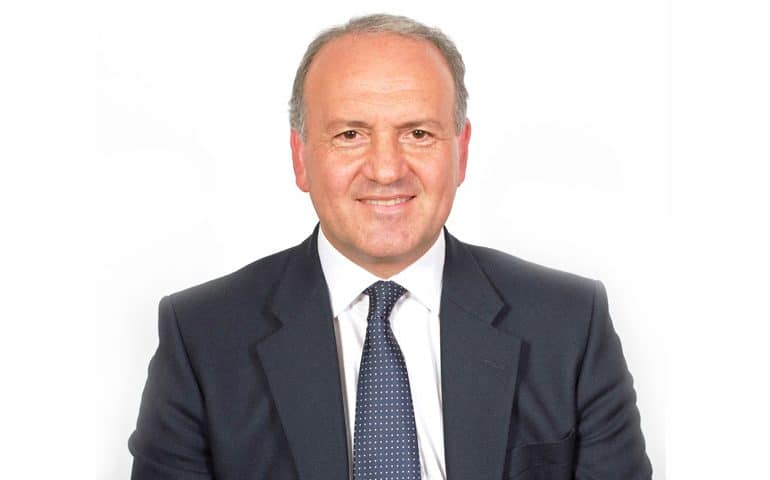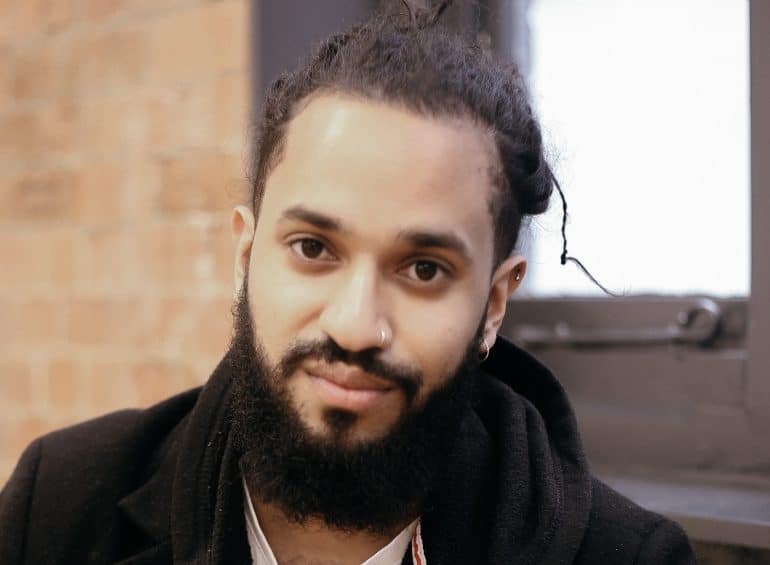Hadleigh Rush’s career has taken him from local charity fund-raising to a key role with software giant VMware, from working in Watford to a new life in the deserts of Arizona.
Yet throughout his professional life, there is one common thread: “I have found a passion for giving back and serving.”
Today, he and his wife, Christa, work for several charitable organisations and he is heavily committed to Make-a-Wish, a non-profit organisation founded in the United States that fulfils life-changing wishes for children with a critical illness.
Had (OE 1985–1990), who recently paid a return visit to QE, says memories of his School days remain clear. Coupled with the appointment of Eamonn Harris as Headmaster in 1984, it was the arrival mid-term of a class from another county whose school was closing that played a key role in saving QE, which was itself slated for closure at the time. “That was my class!” says Had.
“I was a trumpet player with Mr Ellis’s band for most of the time I was at QE. We toured a fair amount to other schools, competitions, the opening of ToysRUs Brent Cross, and we even played on the stage at the Royal Albert Hall – I think we played twice that day.”
His parents were, he says devoted to QE, organising the first coach system (“…as the horrors of the 107 route from QE to Stanmore still haunt me today!”) They also donated Music stand covers for both the band and orchestra. “I was really thrilled to see Music is such a huge part of QE now: our Music room back in the late 80s was just the small area to the left of the main stage by the only computer lab we had at the time.”
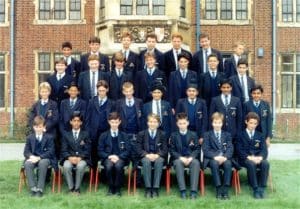 Had was in the cast for the drama production, The Hitchhiker’s Guide To The Galaxy, along with several of the classmates pictured in his class photo. A member of Pearce House, he recalls spending a great deal of time enjoying Drama and Music, as well as in the computer lab and in the library. “I attempted Latin. I received detention a few times in my day and was called into our Headmaster’s [Eamonn Harris] office once, but generally was a well-behaved pupil.”
Had was in the cast for the drama production, The Hitchhiker’s Guide To The Galaxy, along with several of the classmates pictured in his class photo. A member of Pearce House, he recalls spending a great deal of time enjoying Drama and Music, as well as in the computer lab and in the library. “I attempted Latin. I received detention a few times in my day and was called into our Headmaster’s [Eamonn Harris] office once, but generally was a well-behaved pupil.”
On leaving, he studied at the University of Hertfordshire. After that, he embarked on his first career, working for a Watford-based charity with a mission to raise £1m, and then £1m every year, to turn a derelict hospital built in 1925 into what is now the Peace Hospice.
“I spent about six years working for the Hospice, managing a group of about 40 awesome volunteers who never seemed to tire as we raised money through charity shops and holding, or helping to organise, hundreds of public fundraising events. The hospice opened a temporary day care centre in mobile offices, until HRH Princess Michael of Kent opened the main facility in 1996.
“I also was an active member of the Radlett Round Table. During this period, I made so many friendships and relationships with volunteers, local mayors, doctors, celebrities, press, MPs, members of the clergy, JPs and an OBE, some of whom I still communicate with today.
“In 1999, I found myself uprooting my small village way of life and moving to the dry heat of the Sonoran Desert in Arizona.” Unable at the time to afford the cost of transferring his UK qualifications to the US, he went to college there, while also starting a job as a critical accounts specialist for a small, family-run credit counseling agency.”
“This agency grew ten times larger by 2002. Within a year, I found myself passing five IT industry certifications and being hired in the IT department. The following year, I took an active role in designing the IT infrastructure in their new 40,000sq ft state-of-the-art call centre here in North Phoenix. This was my first exposure to some newfangled technology called ‘virtualisation’. I was hooked on VMware.”
[In computing, virtualisation refers to the creation of a virtual (rather than actual) version of something, including virtual computer hardware platforms, storage devices, and computer network resources. VMware is a global company providing cloud computing and virtualisation software and services.]
“After spending ten years at this agency and working my way up the IT ladder, I had completed another degree and a series of updated IT certifications specialising in virtualisation and security.”
Although he had no thought of leaving the company, since he enjoyed the friendly work atmosphere, he applied to, and was interviewed for, all kinds of jobs in order to gain experience in application-writing and interviewing tactics (“Something I recommend if you have the time.”)
“I was contacted by an HR firm in New York who were looking for a Support person for a Phoenix-based company. On the phone, I found out the company, 10ZiG Technology, was across the street from the agency I was working at, so I took the interview with the CEO. The interview lasted an hour: we talked little about the company or position; we talked about life, England and moving to America. The owner of the company was originally from Leicester; the company had offices in the UK, Israel, Sydney and Italy, and was now headquartered in Phoenix. That evening the CEO sent me a rather nice job offer through email. I took two days to think about the offer and graciously wrote back and declined. The next day I received a substantially increased offer to take on the role of Support & Technical Manager of 10ZiG Technology – which I jumped at.
“I spent five years with this company, continuing my passion for virtualisation. I had the pleasure of travelling the US – and a few times back to England – for meetings, dealer presentations/conferences. During this time, I specialised in many different virtualisation solutions, but mainly focused my talents on those from VMware.
He had no intention of leaving “the 10ZiG family”, where the perks included paid visits back home to the UK, until he was contacted by a recruitment officer for the one company that he had dreamed of working for, VMware itself. “The gruelling interview process lasted four months of phone and of one-to-one and panel interviews, which included on-the-spot whiteboarding demonstrations.”
In December 2015, he was offered a position with VMware within its prestigious Technical Account Organization. Today he is a Senior VMware Technical Account Manager, engaged with a small set of VMware US’s large Enterprise customers. “I am my customers’ single point of contact for all their VMware-related questions, and I provide them with enablement, recommendations, coordinate projects, issue-management and problem-solving resolutions from my experience and skill sets. I am constantly building my knowledge and expertise on the latest and future technological solutions that transform traditional IT shops to the next generation of hybrid of on-premises and cloud-based datacentres.”
Three-and-a-half years ago, Had married Christa. They recently moved to an area outside the Phoenix metropolitan area “nestled in the mountains, away from the city life”. Had relishes this environment: “There is a beauty to the Arizona landscape, with the natural hardscaped desert, rock and abundant plant life and animals that survive here. We both enjoy hiking around the mountains in our area, but also enjoy taking a break from the heat by going just 100 miles up the road to the forests.”
That heat can be considerable: on the day he wrote to Alumni News, it hit 111F (44C). “It is something to get used to. Also something to get used to is that Arizona is still considered the wild, wild west, founded just 107 years ago. We have active cattle ranches, bull-riding, gold and silver mines, real cowboys and [the historic town of] Tombstone; gold-panning is still a thing here.
“In my spare time here in Arizona, my wife and I continue our shared passion for giving back and serving. We have spent 10 years volunteering with multiple charitable organisations, such as Canine Companions for Independence (CCI), who breed and train highly skilled service dogs, providing them free of charge. We get to spend time with our puppies in training and also to spend a day golfing with celebrity pro-golfers and even Alice Cooper (pictured with Had).
“Another big volunteering passion of ours is Make-A-Wish, founded in Arizona. My wife and I are on track to grant a total of over 70 wishes for our ‘Wish-Kids’ this year as volunteer ‘Wish-Granters’.”
There is even cross-over between his charity work and his professional career, thanks to VMware’s own ethos of service and its partnership with Make-A-Wish. “Since the beginning of 2019, I have been volunteering my VMware expertise with Make-A-Wish HQ here in Arizona under the guidance of Make-A-Wish’s CIO and Senior IT Director by providing pro bono VMware Team Account Management services. So now I get really get to combine my career and my passion for giving back.”
In addition, VMware takes an active interest in all his charity work, encouraging him to log his hours not only with Make-A-Wish, but also with CCI and church ministries with which he is involved. “Once I reach 40 hours a year (which doesn’t take me long), VMware awards me with $1000 to a send to a charity. This year I have selected The Friends of Queen Elizabeth’s to receive the grant.”
On his recent trip back to QE, he enjoyed the opportunity to spend time with the Headmaster, Neil Enright, and to take a tour. “I thoroughly recommend to any OE to reach out and book time for a visit if you have not been back in the last 10-plus years. I think you will be amazed at the recent history and achievements of Neil, his team and the pupils.”
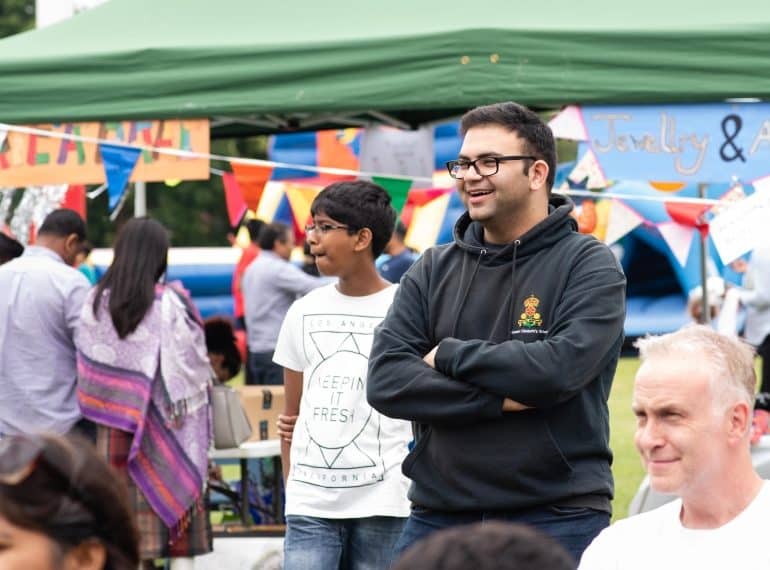
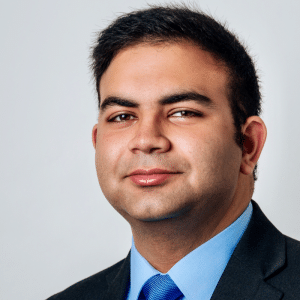 Karan (OE 2006–2013) first began working in the rail industry on internships while taking a Civil and Structural Engineering Master’s degree at Sheffield, which he completed in 2017. He works for the American civil engineering giant, Jacobs.
Karan (OE 2006–2013) first began working in the rail industry on internships while taking a Civil and Structural Engineering Master’s degree at Sheffield, which he completed in 2017. He works for the American civil engineering giant, Jacobs.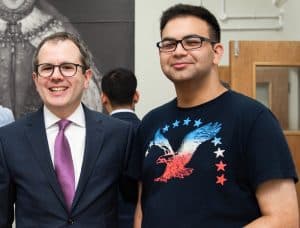 Other volunteering activities include his work as a STEM [Science, Technology, Engineering and Mathematics] Ambassador through the national, Government-backed scheme. “I take part in some events encouraging younger students to take up STEM activities and careers – most recently, at this month’s open day at the London Transport Museum aimed at primary school children, taking questions about jobs and careers in transportation and engineering.”
Other volunteering activities include his work as a STEM [Science, Technology, Engineering and Mathematics] Ambassador through the national, Government-backed scheme. “I take part in some events encouraging younger students to take up STEM activities and careers – most recently, at this month’s open day at the London Transport Museum aimed at primary school children, taking questions about jobs and careers in transportation and engineering.”
 Had was in the cast for the drama production, The Hitchhiker’s Guide To The Galaxy, along with several of the classmates pictured in his class photo. A member of Pearce House, he recalls spending a great deal of time enjoying Drama and Music, as well as in the computer lab and in the library. “I attempted Latin. I received detention a few times in my day and was called into our Headmaster’s [Eamonn Harris] office once, but generally was a well-behaved pupil.”
Had was in the cast for the drama production, The Hitchhiker’s Guide To The Galaxy, along with several of the classmates pictured in his class photo. A member of Pearce House, he recalls spending a great deal of time enjoying Drama and Music, as well as in the computer lab and in the library. “I attempted Latin. I received detention a few times in my day and was called into our Headmaster’s [Eamonn Harris] office once, but generally was a well-behaved pupil.”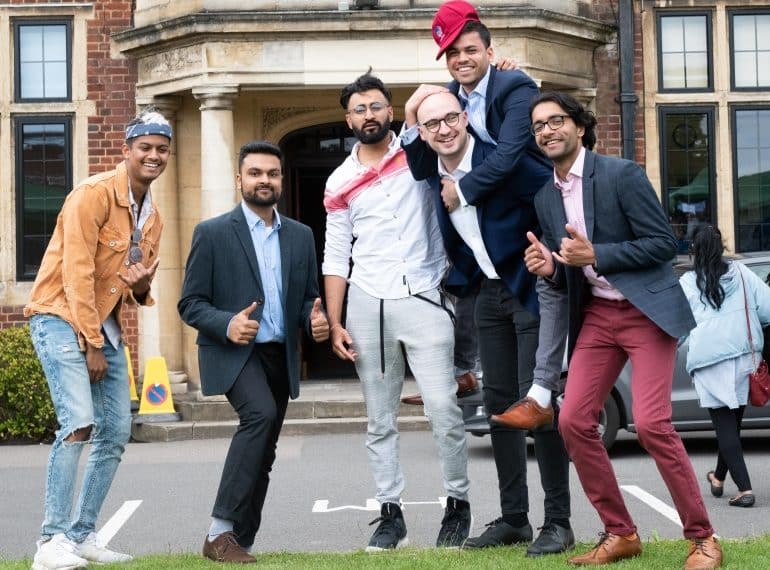
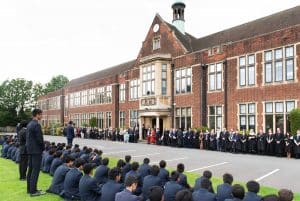 In April, I received a letter from Schools Minister Nick Gibb congratulating QE on being in the top 1 per cent of state schools in two separate areas. One was Progress 8 – a Government measure which tracks academic progress between the end of primary school and GCSEs – for which we ranked higher than any other selective school and in the top 15 of all schools nationwide. Our score of 1.22 means that QE boys achieve more than a whole GCSE grade higher in each subject than their primary school attainment would have suggested. The other area was for the proportion of pupils – in our case, 100 percent – entering the English Baccalaureate (not a qualification, but a combination of core GCSE subjects recommended by the Department for Education).
In April, I received a letter from Schools Minister Nick Gibb congratulating QE on being in the top 1 per cent of state schools in two separate areas. One was Progress 8 – a Government measure which tracks academic progress between the end of primary school and GCSEs – for which we ranked higher than any other selective school and in the top 15 of all schools nationwide. Our score of 1.22 means that QE boys achieve more than a whole GCSE grade higher in each subject than their primary school attainment would have suggested. The other area was for the proportion of pupils – in our case, 100 percent – entering the English Baccalaureate (not a qualification, but a combination of core GCSE subjects recommended by the Department for Education).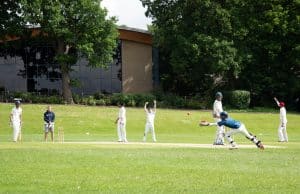 lizabethans turned out in numbers for Founder’s Day, alongside current boys, their families and many other guests. Several of the visiting alumni participated in the afternoon’s cricket fixture, the Stanley Busby Memorial Match, taking on an OE XI. Changeable conditions made for a tricky wicket for the batsmen on both sides. After the old boys were bowled out relatively quickly, a straightforward win for the School seemed to be on the cards, but as the OE attack began toppling the School’s middle and lower order, the game suddenly looked in the balance. In the end, the School was, though, able to surpass the OEs’ total. As ever, a fun and friendly atmosphere pervaded this fixture. Indeed, the same may be said for the afternoon as a whole – the weather held and the atmosphere at the fete was tremendous.
lizabethans turned out in numbers for Founder’s Day, alongside current boys, their families and many other guests. Several of the visiting alumni participated in the afternoon’s cricket fixture, the Stanley Busby Memorial Match, taking on an OE XI. Changeable conditions made for a tricky wicket for the batsmen on both sides. After the old boys were bowled out relatively quickly, a straightforward win for the School seemed to be on the cards, but as the OE attack began toppling the School’s middle and lower order, the game suddenly looked in the balance. In the end, the School was, though, able to surpass the OEs’ total. As ever, a fun and friendly atmosphere pervaded this fixture. Indeed, the same may be said for the afternoon as a whole – the weather held and the atmosphere at the fete was tremendous.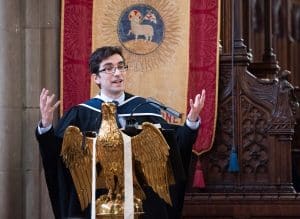 Earlier in the day, we were pleased to welcome Tommy Peto (OE 2003–2010) as our guest speaker at the thanksgiving service. Tommy has recently begun a new role in management and strategy consulting after enjoying a stellar academic career at Oxford. After graduating in the top ten in Philosophy, Politics and Economics out of more than 230 in his year, he went on to take an MPhil in Politics and then his DPhil, which he completed last year. He has won accolades including Clarendon Scholarships, an Open Scholarship at Brasenose College, a Principal’s Commendation for his finals performance, together with Collection Prizes for his performance in college examinations in Statistics, Economics, Logic, Philosophy and Politics. In addition, he has wide experience as a
Earlier in the day, we were pleased to welcome Tommy Peto (OE 2003–2010) as our guest speaker at the thanksgiving service. Tommy has recently begun a new role in management and strategy consulting after enjoying a stellar academic career at Oxford. After graduating in the top ten in Philosophy, Politics and Economics out of more than 230 in his year, he went on to take an MPhil in Politics and then his DPhil, which he completed last year. He has won accolades including Clarendon Scholarships, an Open Scholarship at Brasenose College, a Principal’s Commendation for his finals performance, together with Collection Prizes for his performance in college examinations in Statistics, Economics, Logic, Philosophy and Politics. In addition, he has wide experience as a 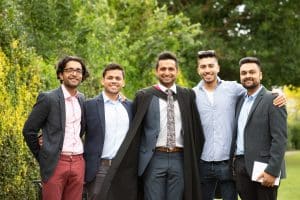 debater and debating coach, having taught the subject to the Foreign and Commonwealth Office, to the Oxford Union’s élite debating squad and, as a volunteer, to schoolchildren.
debater and debating coach, having taught the subject to the Foreign and Commonwealth Office, to the Oxford Union’s élite debating squad and, as a volunteer, to schoolchildren.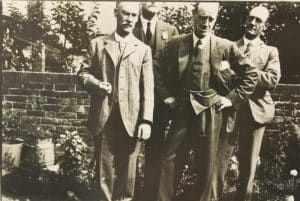 Harry (‘Curly’) Mayes, who served the School for a remarkable 60 years as porter, steward and caretaker. Having been appointed in 1902 under our last Victorian-era headmaster, John Bond Lee, Mr Mayes continued working until a few weeks before his death on Remembrance Sunday, 1962. He is pictured here, standing on the left mulling over a problem with others, probably in the 1930s. Other recent work on-site here has included the creation of an airy atrium linking both sides of the Fern Building, as well as structural work in the Art department and Science corridor.
Harry (‘Curly’) Mayes, who served the School for a remarkable 60 years as porter, steward and caretaker. Having been appointed in 1902 under our last Victorian-era headmaster, John Bond Lee, Mr Mayes continued working until a few weeks before his death on Remembrance Sunday, 1962. He is pictured here, standing on the left mulling over a problem with others, probably in the 1930s. Other recent work on-site here has included the creation of an airy atrium linking both sides of the Fern Building, as well as structural work in the Art department and Science corridor.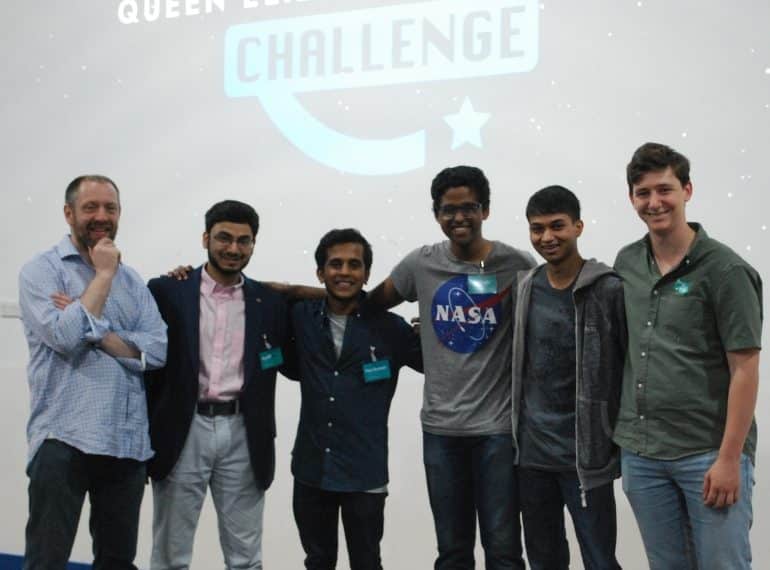
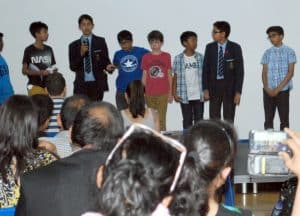 Aadil Kara (OE 2010–2017), who has just completed the second year of a Physics degree at Imperial College, is currently Chair of the Galactic Challenge (GC) – a regional competition for younger pupils and a sister competition to the UK Space Design Competition (UKSDC). In his final year at QE, Aadil progressed from the UKSDC to the International Space Settlement Design Competition, hosted by NASA’s Kennedy Space Center.
Aadil Kara (OE 2010–2017), who has just completed the second year of a Physics degree at Imperial College, is currently Chair of the Galactic Challenge (GC) – a regional competition for younger pupils and a sister competition to the UK Space Design Competition (UKSDC). In his final year at QE, Aadil progressed from the UKSDC to the International Space Settlement Design Competition, hosted by NASA’s Kennedy Space Center.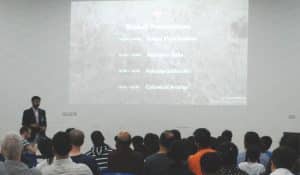 Helping Aadil and Mr Brooke were Aadil’s QE contemporaries and former UKSDC co-competitors, Neelesh Ravichandran, Harikesan Baskaran and Sam Bayney, as well as David Dubinksy, who attended QE from 2012–2016. Neelesh, Harikesan and Sam all served as Coordinators on the day, while David, who, like Aadil, reached the international stages of UKSDC in his year, was the volunteer CEO for one of the competing teams, or ‘companies’.
Helping Aadil and Mr Brooke were Aadil’s QE contemporaries and former UKSDC co-competitors, Neelesh Ravichandran, Harikesan Baskaran and Sam Bayney, as well as David Dubinksy, who attended QE from 2012–2016. Neelesh, Harikesan and Sam all served as Coordinators on the day, while David, who, like Aadil, reached the international stages of UKSDC in his year, was the volunteer CEO for one of the competing teams, or ‘companies’.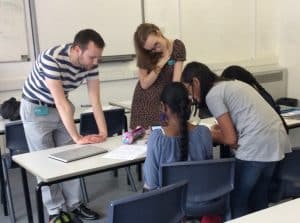 At QE, in addition to the School’s own Year 7 company, named Columbus Aviation, there were entries from: Dame Alice Owen’s School; The Charter School, North Dulwich; The Henrietta Barnett School and The Latymer School.
At QE, in addition to the School’s own Year 7 company, named Columbus Aviation, there were entries from: Dame Alice Owen’s School; The Charter School, North Dulwich; The Henrietta Barnett School and The Latymer School.